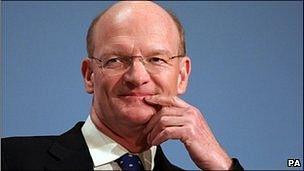Unlimited tuition fees 'not sustainable', says Willetts
- Published

Mr Willetts acknowledged concerns over the proposed levy
The Universities Minister David Willetts appears to have ruled out allowing universities to set unlimited fees.
He has said such a system would be neither sustainable nor sensible.
A review by Lord Browne recommended universities in England be free to set their own fees, but face a levy on sums above £7,000.
Mr Willetts said no decision had yet been made on a limit.
But he said proposals to raise fee levels would be put before parliament by Christmas.
Addressing vice-chancellors at a conference held by the Higher Education Funding Council for England, Hefce, Mr Willetts said there were some "very difficult issues" around the proposed fee cap and levy.
Lord Browne proposed that a levy would start at 45% on the first £1,000 above £6,000, and rise by 5% on each £1,000 above that, and go towards funding the cost to the government of lending the money to students.
But Mr Willetts said the idea had "aroused quite a lot of concern across the sector", and said it could cause universities to drive their fees up higher to reach a given level of income.
He said the government recognised there were arguments for a lower levy or for "sticking with a fee cap".
Speaking later in response to reporters' questions, he said: "I don't think it's sensible or sustainable to imagine having an unlimited fee cap."
Last week Business Secretary Vince Cable, a Liberal Democrat, said he was considering a £7,000 fees cap.
Dr Wendy Piatt, director general of the Russell group of research-intensive universities said: "Rowing back from Browne and re-imposing a cap would be a real waste of an opportunity to allow our leading universities to provide the high quality education that their students deserve".
"However, while we acknowledge the need for some contribution to the costs of higher loans, we are concerned about the large size of the levies proposed by Browne," she added.
The coalition government is split on the issue of how to fund higher education, with a number of Lib Dem MPs threatening to rebel over any rise in tuition fees.
Early repayment
Mr Willetts, a Conservative, and Mr Cable, have been trying to reach a compromise they are confident would pass a parliamentary vote.
Mr Willetts also said the government hoped to announce plans for more generous grants and loans for poorer students "shortly".
He said the government was currently "examining carefully" ways of making the proposed university funding system more progressive (easier on poorer students).
Mr Browne suggested that graduates pay an increased level of interest on their loans.
One suggestion to make the system more progressive is to introduce some form of early repayment penalty or limit, to ensure that students on higher incomes still paid back increased interest over the course of their repayments.
"There is a feeling that it would be unfair if the better-off could reduce their payments by paying early," Mr Willetts told the vice chancellors.
On Wednesday, the government announced a 40% cut to the higher education budget. Science and maths is being protected.
Mr Willetts said the savings would be focused towards the second half of the four year period covered by the Spending Review.
At the Hefce conference, he faced accusations from university leaders and the president of the National Union of Students Aaron Porter that the government was removing funding from the teaching of the arts.
Mr Porter said said the cuts had confirmed "that this is the abolition of state funding for the arts and social sciences".
Mr Willetts denied this, saying higher fees would mean more money coming from students supported with government-backed loans.
"Funding remains but it flows in a different way," he said.
Lord Browne suggested the government's teaching grant to universities could be cut by up to 80% if his system of increased graduate contributions was introduced.
Currently students in England, Wales and Northern Ireland are charged a maximum of £3,290 in fees per year.
The government pays the money up front, and the student then pays it back once their income reaches £15,000 after graduating.
University courses in Scotland are free to Scottish students, although there is increasing pressure for some form of graduate contribution.
- Published12 October 2010